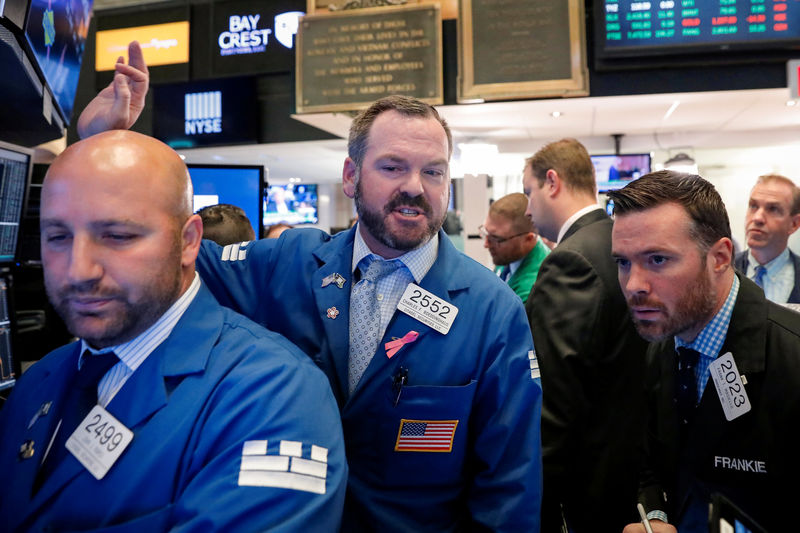By David Randall
NEW YORK (Reuters) - A reshuffling of Wall Street benchmark industry sectors that transferred high-flying FANG stocks like Facebook Inc (O:FB) and Google-parent Alphabet Inc (O:GOOGL) out of the technology label may be a boon to some under-the-radar companies that used to compete with them for investor attention.
Companies such as Cisco Systems Inc (O:CSCO), Juniper Networks Inc (N:JNPR), Xerox Corp (N:XRX), Akamai Technologies Inc (O:AKAM), and Texas Instruments Inc (O:TXN) that do not often grab headlines could be among the unexpected winners from the largest reclassification of companies on Wall Street since 1999, fund managers say.
That is because fund managers who are looking for technology exposure may be willing to add positions in companies that they previously overlooked now that Alphabet and Facebook have been regrouped into the new communications services sector and are no longer an option.
"At the end of the day, there are a lot of investors who are very sector-aware," said Steve Chiavarone, a portfolio manager at Federated Investors in New York.
"If you're a smaller tech company, this is great because you no longer have to compete against Google for capital."
The overhaul by S&P Dow Jones Indices of the Global Industry Classification Standard (GICS) took effect on Monday. The changes are meant to reflect how the tech, media and consumer industries have evolved. Maintained by S&P and MSCI since 1999 and widely used by portfolio managers, the taxonomy classifies companies across 11 sectors.
The communication services sector will include three out of the four so-called FANG stocks - Facebook, Amazon.com Inc (O:AMZN), Netflix Inc (O:NFLX) and Alphabet - even though investors widely consider them the leaders of the tech rally that powered the stock market higher in recent years.
While Alphabet and Facebook will leave technology, Netflix will be moved out of consumer discretionary to join the renamed sector. Amazon.com will stay put in consumer discretionary.
Shares of Alphabet, which made up approximately 10.2 percent of the technology sector, are up 12.3 percent for the year to date. After Apple (NASDAQ:AAPL), Microsoft Corp (O:MSFT), Visa Inc (N:V), Intel Corp (O:INTC) and Cisco now round out the S&P tech index's largest five components.
Overall, the regrouping of companies in new sectors is expected to generate more than $30 billion in market activity as active investors and passive exchange-traded funds (ETFs) recalibrate their positions to reflect the new weightings, according to estimates from State Street.
While most diversified fund managers have wide leeway in deciding what companies to own, most tend to hug the weightings of the S&P 500 sectors when constructing their portfolios.
That means that if a fund manager used to own Alphabet as a way to gain technology exposure, he or she would need to find another company to fill that hole now that Alphabet is in another sector.
PLAYING DEFENCE
The shuffling of benchmark sectors may also make it harder for investors to play defence during the next market sell-off. Former value-stock companies like AT&T Inc (N:T) that were in the telecommunications sector are now lumped together with growth-focused companies like Netflix Inc (O:NFLX) in the communications services sector.
"In times when you would want to play defence and allocate to telecom, you can't really do that anymore," said Cliff Hodge, director of investments for Charlotte, North Carolina-based Cornerstone Wealth.
Approximately 61 percent of the new communications sector will be growth stocks - so named because investors are often willing to pay a higher multiple in anticipation of above-market growth rates - while 100 percent of the former telecommunications sector were value stocks, the name given to companies that have slower growth rates but better dividends and balance sheets, according to State Street Advisors.
The former telecom sector traded at a forward price to earnings ratio of 10.6, nearly half of the 19.3 P/E of the new communications sector.
The sector paid a dividend yield of 5.45 percent, making it an attractive place for investors to hide during market downturns. Yet the sector, renamed communication services, now includes stocks like Netflix, which doesn’t pay a dividend at all.
With the telecom sector gone, more investors will gravitate toward consumer staples and utilities sectors, which have become a popular - and expensive - place for dividend income, said Jeffrey Liguori, chief investment officer at Providence, Rhode Island-based Napatree Capital.
"Verizon (NYSE:VZ) is not a telephone company anymore and neither is AT&T," he said. "They should be trading like media companies and getting valuations that are more appropriate as well."
